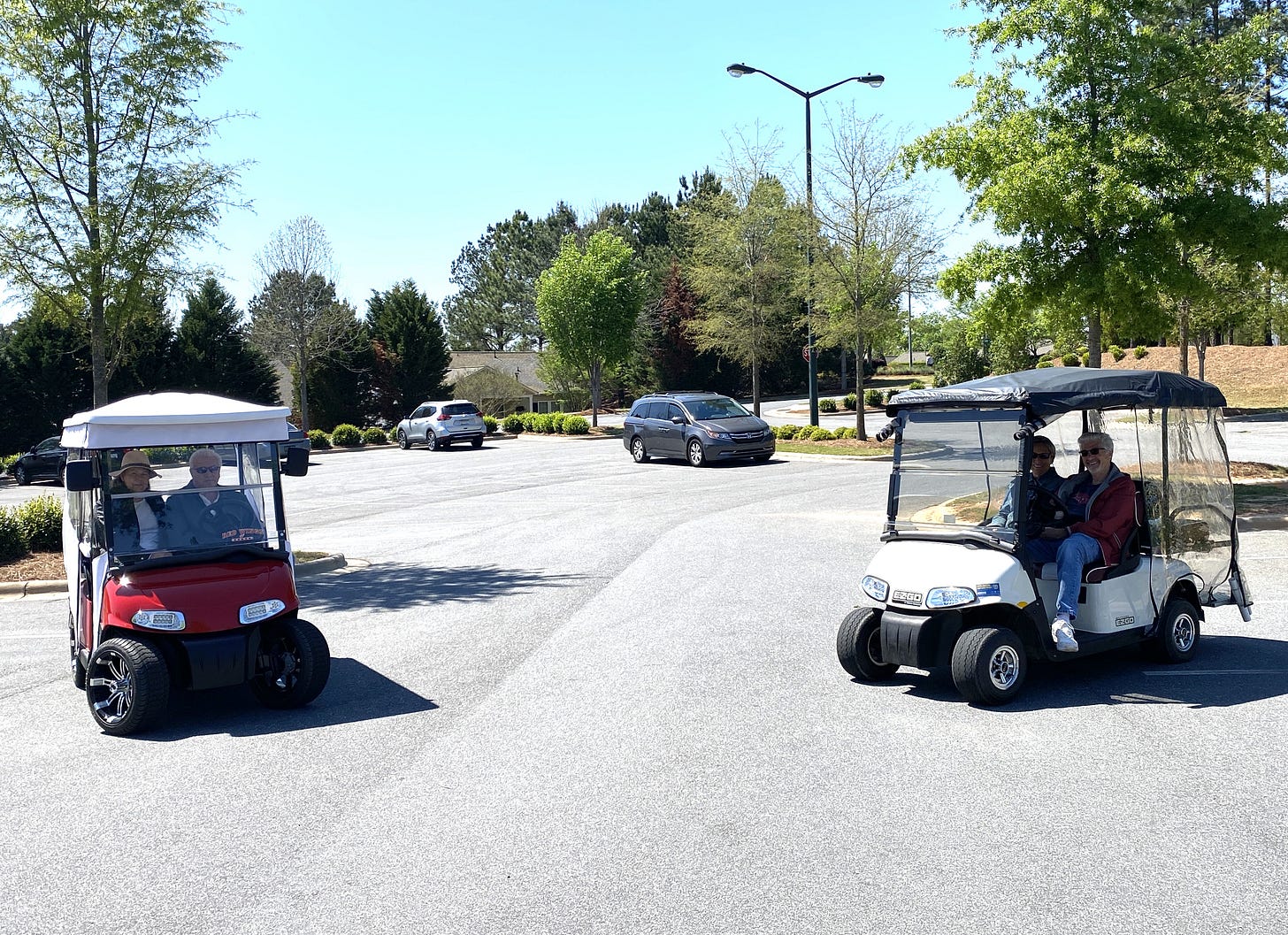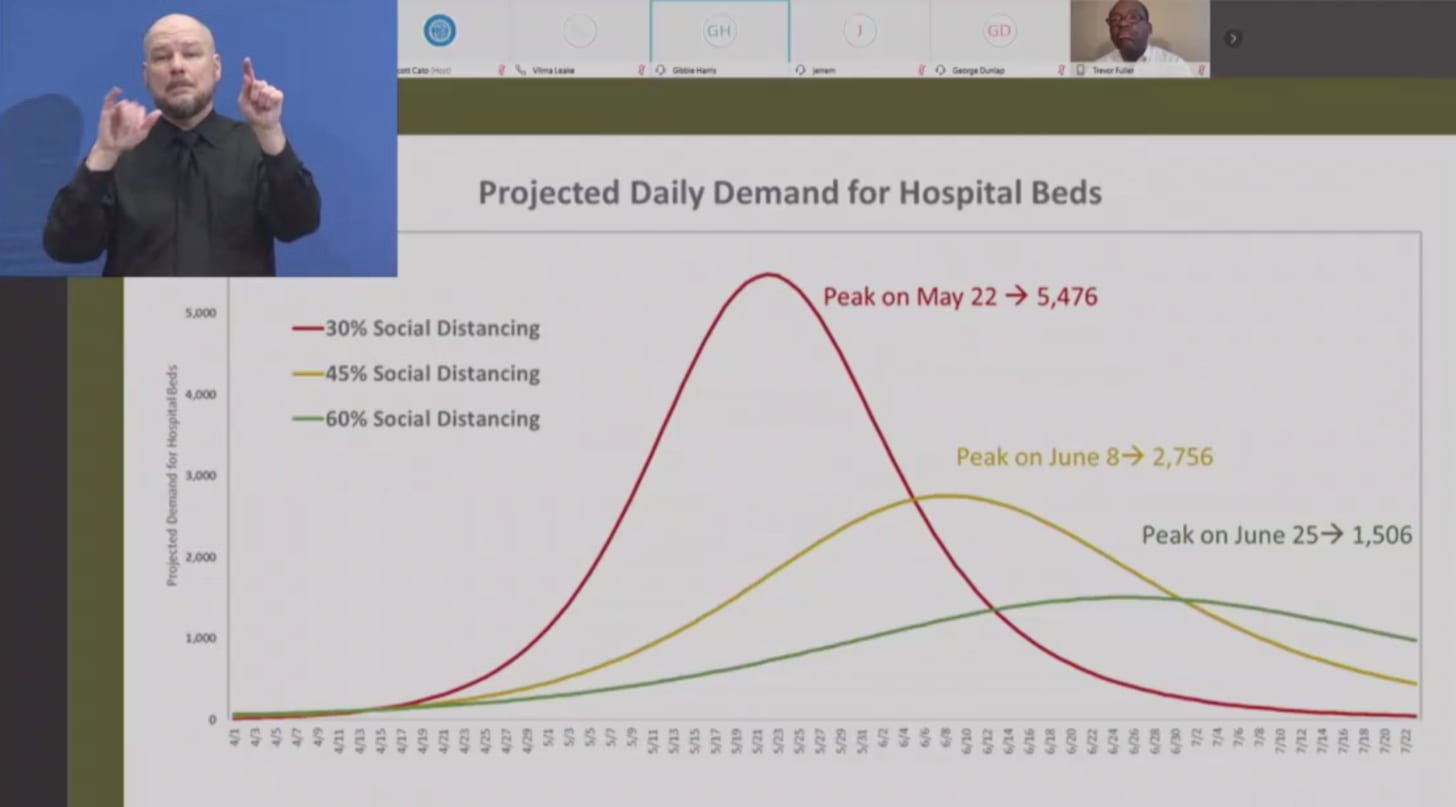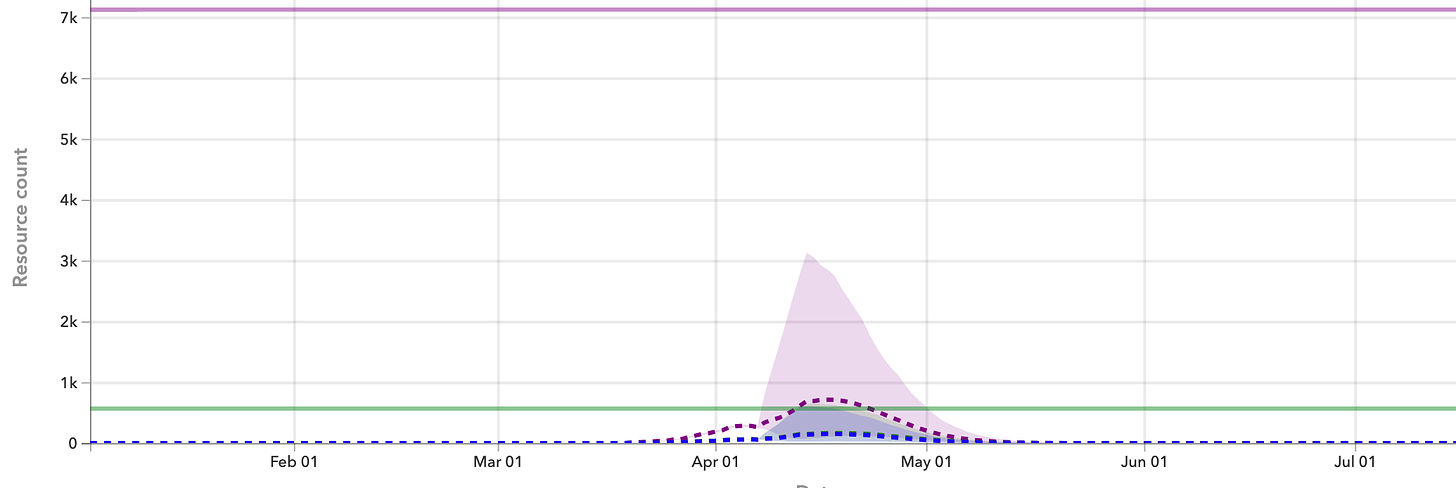In Sun City, golf cart cruising is the new canasta
Plus: How accurate is the county's coronavirus forecast?; County recommends wearing face coverings at stores; Domestic violence rises 20% after 'stay at home' order
Today is Thursday, April 16, 2020. You’re reading a SPECIAL BONUS ISSUE of The Charlotte Ledger.
If you like what you see, please forward to a friend.
Need to subscribe? Sign up for free here (charlotteledger.substack.com). A paid subscription, starting at $9/month, gives you access to all articles and helps build smarter original, local news in Charlotte. Details here.
Active adults forced to adjust to quieter social calendar; Goodbye, bocce and bridge, hello 'golf cart rides and watching Zoom'

Sharon and Ed Beether (left) and Mary and Joe Cardullo live on the same street but decided that remaining in their golf carts a healthy distance apart in a Sun City parking lot would be the safest way to visit face-to-face.
By Cristina Bolling
It’s mid-afternoon on a sunny Saturday, right about the time Mary and Joe Cardullo and Ed and Sharon Beether should be making plans for a double-date dinner or hitting the bocce ball courts in their community of Sun City Carolina Lakes.
They live just 16 houses down the street from each other in this massive over-55 community six miles over the state line in Indian Land, S.C. But there’s no popping into each other’s homes these days for a quick catch-up.
This afternoon, both couples decided they needed to see each other face-to-face, so they hopped in their golf carts and zipped down to a parking lot in the center of Sun City, parked a generous 15 feet apart and sat in their respective carts for some laughs and a good long chat.
“It’s so much easier, because we get to spend a half-hour, 45 minutes together, talking,” says Joe Cardullo, with a shrug of his shoulders. “On the phone, it doesn’t work that way.”
“It’s just so nice to see each other,” chimed Sharon Beether.
Sun City is billed as one of the region’s biggest “active adult” communities, with some 3,160 homes and more than 5,000 inhabitants. Communities like it continue to spring up across Charlotte, as more retirees move here to join children and grandchildren.
Higher risk: They are the population most vulnerable for falling seriously ill with coronavirus. Local health officials say those over age 60 are four times more likely to be hospitalized. Across North Carolina, 80% of Covid-19 deaths occur in patients aged 65 and older.
There have been six outbreaks reported at nursing homes and residential care facilities in Mecklenburg County, and the Centers for Disease Control have issued special guidelines for preventing the spread of Covid-19 in retirement communities and nursing homes.
In healthier times, Sun City residents pack pickleball and bocce ball courts from dawn till dusk, organize more than 100 clubs around interests from railroad travel to jewelry making, and even stage and star in four elaborate theater productions each year. (This May’s scheduled production of the musical “Echoes of War” has been postponed to October.)
“If you want to just buy just a home, you don’t come here. You can buy a bigger home with more land for less money elsewhere,” Joe Cardullo says. “You come here, and it becomes a lifestyle.”
Life, interrupted: That lifestyle has changed drastically since Sun City shut down all of its indoor and outdoor public spaces and canceled all activities in mid-March out of fear of Covid-19. (And it seems to be working: So far, none of the Sun City residents the Ledger spoke with knew of any residents or staff who have tested positive for coronavirus.)
Suddenly, there was no Saturday Night Dance Fever to attend, or Friday night karaoke. Tennis, water aerobics and yoga all halted. Stitch-n-chat, mahjong and bridge clubs canceled. Gone for now are the days of waking at 6 a.m. to register for the uber-popular Cellar Dwellers wine club or the Cooking Fingers kitchen demonstration and tasting.
For seniors used to a packed social schedule, the pause feels, well, off.
“In the beginning, it was kind of nice, because you weren’t going out every single night,” laughs Fran Hohenberger, who moved to Sun City from Long Island with her husband, Bob, four years ago to be near her son and daughter-in-law and two granddaughters who live in nearby Ballantyne.
Golf carts and Zoom: It didn’t take Hohenberger long to find digital workarounds to staying connected with her friends and activities.
Quickly, she learned Zoom and now logs on to attend yoga and to watch Sun City board meetings. Soon, her stitch-n-chat sewing club will be meeting virtually. Her canasta group is still figuring out how to play through Zoom, but she’s playing Scrabble with people she knows using the gaming app Words With Friends.
And when she’s tired of the screens, there’s always the miles of walking paths that weave through Sun City or the golf cart she and Bob can take out for some fresh air.
“It’s golf cart rides, and watching Zoom,” Hohenberger said of life these days in Sun City. “They’ve done a wonderful job of keeping us as busy as you want to be. I don’t feel depressed here at all.”
From packed social schedule to cleaning out the garage: Carolyn Sheridan and her husband, Bob, were some of Sun City’s early residents. They moved down from Maryland 11 years ago to be near their two daughters and their families while the community was still being built, and they bought their house brand-new.
Carolyn Sheridan isn’t too keen on Zooming, and these days she’s missing seeing friends at Monday’s computer and lifelong-learning clubs, Tuesday’s stitch-n-chat, Wednesday’s Bible study and Friday’s mahjong. Bob was on the backstage crew for the now-postponed “Echoes of War.”
“We were very active,” she says.
Even standing outside and chatting with a neighbors at a safe distance can be tricky, she says, because residents zipping by on golf carts also want to stop and chat, and suddenly, there’s an illegally large group gathered on the street.
One of the things Sheridan says she misses most are how activities would often end with friends going out to lunch or dinner together. “Now, I’m here in the kitchen,” Sheridan says. And in the garage, which she and Bob have cleaned out. And their home office area, sorting through files.
Sheridan keeps up with her friends through texts and phone calls, and most of her contacts, she says, are like her — “doing the things they had wanted to do, but never took the time to do.”
And waiting for when they can get back out there and fill the activities centers and the sports courts once again.
“People are putting up with it so far,” Sheridan said, “but I think if it goes till June, it’ll be a different mood.”
Reach managing editor Cristina Bolling at cristina@cltledger.com
How accurate is the county’s coronavirus forecast?
The good news is that social distancing in Mecklenburg County seems to be working. The bad news is that it’s working so well that the expected surge of cases won’t materialize until June.
That was the frustrating message delivered this week from county health director Gibbie Harris to Mecklenburg commissioners. The county seems likely to avoid some of the earlier, dire forecasts, but the need for hospital beds and ventilators could strain local healthcare resources when cases spike, according to county projections:

But is there really a spike coming?
Like a hurricane: Harris and County Manager Dena Diorio have repeatedly likened coronavirus forecasting to predicting the path of a hurricane: It’s imprecise and can change course quickly. Previous forecasts have been wrong — like the ones two weeks ago that said the county would require a 3,000-bed field hospital.
And the number of new daily cases in Mecklenburg has been low for the last week — which Harris says stems from fewer tests being performed over Easter weekend.
Harris said the county, working with Atrium Health and Novant Health data experts, is using a model from the University of Pennsylvania to help forecast.
But other national models provide dramatically different projections. The University of Washington, for example, predicts that North Carolina will reach its peak number of cases tomorrow and that the final coronavirus death in the state will be May 10 — about a month before the county’s estimates say hospitalizations will peak:

Asked by commissioners about the different models, Harris said Tuesday:
We’ve looked at three different models. What those models did for us is they showed us the very best possible projections, the very worst possible projections and sort of a middle of the line. The Washington projections that we looked at really gave us a very favorable outlook. Based on our conversations with the hospitals and working with their data folks and our data folks, the decision was made that we wanted more of a middle-of-the-road projection. …
Would I like the Washington projections? Yeah. They showed more favorable outcomes. But we felt that this was more reasonable based on what we were seeing here.
At a news conference this week, state Health and Human Services Secretary Mandy Cohen said the state’s modeling doesn’t indicate when the spread of the virus will slow, adding: “I don’t see a peak at this moment in time. It doesn’t mean I see a surge, either.”
The uncertainty about the future direction of confirmed cases illustrates the difficulty government leaders and business owners will face. It’s tough to plan for the future when you can’t say with certainty what that future will look like. — TM
New preferred term: ‘physical distancing’
In presentations this week, city and county leaders have started using a term that’s now gaining traction to replace what we have all been calling “social distancing.” The favored term, apparently, is “physical distancing.”
CNN reported yesterday that the term “physical distancing” is now favored by the World Health Organization:
The reason? The term “social distancing” can imply a sense of disconnection from loved ones. And at a time when being physically isolated from others can take a toll on mental health, the organization wants to emphasize how critical it is for people to stay socially connected. …
“We’ve been saying ‘physical distancing’ because it’s important to remain physically separate but socially connected,” [WHO infectious diseases epidemiologist Maria] Van Kerkove said, adding that people should be looking after their mental health and that of their loved ones during the pandemic.
“There’s no lockdown on laughter,” she said. “There’s no lockdown on talking to your family and finding ways to connect.”
— TM
Questions about coronavirus? Ask an expert
The Ledger will host an online chat on today at 10 a.m. with Dr. Amina Ahmed, an Atrium Health infectious disease expert.
She’ll take your questions on medical-related aspects of the coronavirus, such as how Covid-19 differs from the flu, how it spreads, who is most vulnerable and why and what you should do if you’re feeling sick.
Look for an email from The Ledger at 10 a.m., which will have a link to the online discussion. It will last about 30-45 minutes and will be available to read afterward.
In brief:
Face covering recommended: Mecklenburg County health officials on Wednesday recommended wearing “cloth face coverings in public settings where other social distancing measures are difficult to maintain,” such as in grocery stores and pharmacies. It said the face coverings could be bandanas or “cut pieces of cotton fabric sewn together” and that they should not be placed on children under 2 or “anyone who has trouble breathing, or is unconscious, incapacitated or otherwise unable to remove the mask without assistance.” (Health department)
Domestic violence rises: Domestic-violence calls have risen 20% since the beginning of Mecklenburg County’s “stay at home” order in March, Charlotte-Mecklenburg Police said Wednesday. That’s 350 more cases compared with the same period a year ago, a CMPD detective said: “We can’t say that it is related to the stay-at-home order, but we can’t say that it is not, either.” (WFAE)
Loan fund runs dry: The $349B government-guaranteed loan program for small businesses was expected to have run out of money by Wednesday. The Paycheck Protection Program loans “are available on a first-come first-served basis. But without more funding, many small businesses that have flooded banks with applications won’t get help.” The federal government might allocate more money for the program. (Bloomberg)
Governor envisions lifting some restrictions: Gov. Roy Cooper on Wednesday outlined requirements he’d like to see for easing coronavirus restrictions. He said the state needs more testing, enhanced abilities to trace new cases and better data before lifting portions of the state’s “stay at home” order. “As we ease restrictions, we are going to enter a new normal,” Cooper said in a statement. “We want to get back to work while at the same time preventing a spike that will overwhelm our hospitals with Covid-19 cases.”
Stimulus money arrives: The first round of economic stimulus payments started arriving in bank accounts on Wednesday, temporarily overwhelming banks including Truist, U.S. Bank, JPMorgan Chase and Citi. Wells Fargo said it had no problems and that the “daily volume of direct deposits hit a record high and was roughly three times the average.” (Wall Street Journal, subscriber-only)
Moving online: In an interview, Packard Place startup hub founder Dan Roselli said he is proud that “we went very quickly to what I call the ‘virtual, not cancelled’ movement” and shifting everything online because “people really want to still have community.” Asked what trends he’d like to see carry on after the pandemic passes, he said: “Drinking alone together. That should continue.” (Charlotte Is Creative)
No tattoos: The owner of a NoDa tattoo parlor says he spent more than $3,000 to keep his business clean and safe before the state ordered it shut late last month, and he doesn’t understand why other businesses are allowed to remain open if he can’t be: “Home Depot plants and mulch? Birthday parties? ABC stores? A construction site of the 25th condo to be built in NoDa? I’ll submit our shop is much, much safer than any of those environments.” (CharlotteFive)
Food deliveries: The Charlotte chapter of Frontline Foods will have delivered 780 meals through the end of the week to hospital workers and first responders with Atrium, Novant and Medic, the group said Wednesday. The nonprofit raises money to buy healthy meals from Charlotte restaurants and delivers them at no charge to healthcare workers.
When the ‘stay at home’ order ends: Commissioners in Gaston and Lincoln counties are urging Gov. Roy Cooper to allow counties to determine when businesses reopen after the state’s “stay at home” order expires on April 29, instead of having an order from Raleigh. “Not a day goes by that I don’t hear from a business owner that is worried how they can keep the lights on,” the chairman of the Gaston County board of commissioners wrote. “The shutdown and uncertainty is causing a disruption that could take years to recover from.” (Observer)
Loves me some internet

Georgia looks fetching in new Charlotte Ledger bandana

Hi, my name’s Georgia. My owner says we can’t go to the parks anymore, so I’ve been enjoying long walks around the neighborhood. You should see the respect other dogs give me when I’m wearing my new Charlotte Ledger “Doggone Essential” bandana. They’re only $13, and if you use the code CLTL20 at check-out, you get free shipping. Isn’t there a four-legged friend in your life who could use one?
Did I mention that a portion of the proceeds are donated to the Covid-19 Essential Needs Fund, which supports our hardworking local healthcare workers?
Get your paws on a bandana today with this link. There are T-shirts for humans, too, at this link here.
Retrieve one today!
Need to sign up for this e-newsletter? Here you go:
Got a news tip? Think we missed something? Drop us a line at editor@cltledger.com and let us know.
Like what we are doing? Feel free to forward this along and to tell a friend.
Archives available at https://charlotteledger.substack.com/archive.
On Twitter: @cltledger
Sponsorship information: email editor@cltledger.com.
The Charlotte Ledger is an e-newsletter and web site publishing timely, informative, and interesting local business news and analysis Mondays, Wednesdays, Fridays and Saturdays, except holidays and as noted. We strive for fairness and accuracy and will correct all known errors. The content reflects the independent editorial judgment of The Charlotte Ledger. Any advertising, paid marketing, or sponsored content will be clearly labeled.
Executive editor: Tony Mecia; Managing editor: Cristina Bolling; Contributing editor: Tim Whitmire; Reporting intern: David Griffith


